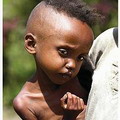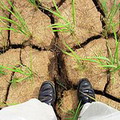 世界上最富裕國家的G8年度高峰會於7月6日在日本開幕,相滅相生的糧食和石油問題將會是整個議程的重點。
世界上最富裕國家的G8年度高峰會於7月6日在日本開幕,相滅相生的糧食和石油問題將會是整個議程的重點。
世界銀行集團的總裁佐利克(Robert Zoellick)於7月1日呼籲G8領袖和主要產油國立刻針對高漲糧食和能源價格展開行動,同時警告全世界正在進入「危機期」。
佐利克表示這個問題影響層面之嚴重,讓世界銀行從2億元美金的補助基金中提撥出援款給12個國家,這筆基金是12億緊急金融援助基金的一部份,但是他說現在世界銀行仍接收到來自31個國家,金額高達4億的新增需求。
「這些請求援助的申請遠遠超過我們擁有的資源,然而快速金融援助,包含了一個由多方贈與者形成的信託基金,可以隨時預備提供緊急援助。」
佐利克的呼籲聲明包含了一封給在日本召開G8高峰會領袖們的信,其中表示,根據該銀行、聯合國糧食計畫署和國際貨幣基金的估計,需要約100億美金來應付這一波危機的短期需求。
「我們現在所見到的並不是自然災害,這是一場人為的災難,也應由人為力量所解決。」佐利克表示。
這位世界銀行的主席提及G8在2005年在英國格倫依格斯(Gleneagles)的高峰會曾經承諾在2010年前要提升整體性開發援助,特別針對非洲地區。他說現在正是需要這樣的援助,因為那些嚴重受到糧食和石油價格危機的國家中,有2/3位於非洲。
聯合國糧農組織(FAO)的主席狄伍夫(Jacques Diouf)於7月3日布魯塞爾的州議會中表示,因為高食物價格,全世界飢餓的人數在2007年增加了約5千萬人。
「貧窮國家感受到嚴重的衝擊,」這位FAO的領袖說道,「我們急迫地需要更健全的合作關係來解決貧窮國家糧食安全問題。沒有任何一個機構或是國家可以單獨解決這個問題,捐贈國、國際組織、開發中國家的政府、整個社會和企業都應為全球對抗糧食危機盡一份力。」
全球農業也要面對相當大的挑戰,像是水資源的限制和氣候變遷的問題,帝奧夫強調全球仍還有未開發的資源可以利用。
超過12億居住在河川流域的人們今日仍有水資源缺乏的問題,而缺水危機的日益增長也相當令人擔心,但是非洲地區的薩哈拉以南只有使用4%的可再生水資源。
 由於嚴重的環境退化,每年全球損失了500-1000萬公頃的農業用地,但是如果經過開墾,在非洲、拉丁美洲和中亞等地區仍有相當的潛力來擴增農地,
由於嚴重的環境退化,每年全球損失了500-1000萬公頃的農業用地,但是如果經過開墾,在非洲、拉丁美洲和中亞等地區仍有相當的潛力來擴增農地,
即使他們兩人是個別對於飢餓的援助提出呼籲,但佐利克f和狄伍夫都同時提及現在就是展開行動的時候了。「現在的情況是由國際社會長期忽略開發中國家的農業所造成。」狄伍夫表示。
在他的信中,佐利克極力請求G8去研究以下的兩個方法「來加強全世界解決長期食物危機的能力。」首要之務就是聯合國將針對保證世界糧食計畫署的部分資金進行研究。第二個就是研究一個國際合作的糧食危機,解決方案,此方案是關於針對人道援助的虛擬策略性糧食儲存系統。
「國際社會在全球化的時代,將面臨前所未有的考驗,」他表示,考驗在於我們是否可以在他人需要援助時「快速地」給予回應。
When the Group of Eight, G8, leaders of the world's wealthiest countries open their annual meeting Monday in Japan, the twin issues of food and fuel costs will be front and center on the agenda.
On Wednesday, World Bank Group President Robert Zoellick called on the G8 leaders as well as the major oil producers to act now to deal with surging food and energy prices, warning that the world is "entering a danger zone."
Zoellick said the crisis is so widespread that the World Bank has already provided funding for 12 countries from a $200 million grant fund, which is part of an overall $1.2 billion rapid financing facility to offer prompt assistance. But he said the bank currently has almost $400 million of additional new requests from 31 countries.
"These calls for help outstrip our available grant resources. The rapid financing facility includes, however, a multi-donor trust fund that is up and running, ready to be of immediate help. Donors should use this as a vehicle to provide help fast. "
Zoellick's call is contained in a letter to the head of the upcoming G8 summit in Japan, in which the Bank, the UN World Food Programme, and the International Monetary Fund estimate that about $10 billion is needed to meet short term needs of people hit hardest by the crisis.
"What we are witnessing is not a natural disaster - a silent tsunami or a perfect storm. It is a man-made catastrophe, and as such must be fixed by people," Zoellick said.
The World Bank chief recalled that the G8 made a commitment at the UK's Gleneagles Summit in 2005 to boost overall development aid, to Africa in particular, by 2010. He said such aid is needed now, more than ever, as Africa accounts for two-thirds of the countries under the greatest stress due to the food and fuel crisis.
The number of hungry people increased by about 50 million in 2007 as a result of high food prices, FAO Director-General Jacques Diouf said today, addressing a conference at the European Parliament in Brussels.
"Poor countries are feeling the serious impact of soaring food and energy prices," said the head of the UN Food and Agriculture Organization, FAO. "We urgently need new and stronger partnerships to address the growing food security problems in poor countries." Dr. Diouf said "No single institution or country will be able to resolve this crisis," he said. "Donor countries, international institutions, governments of developing countries, civil society and the private sector have an important role to play in the global fight against hunger."
World agriculture will also have to address major challenges, like water control and climate change, Diouf said, emphasizing that the world does have untapped resources to utilize.
More than 1.2 billion people today live in river basins with absolute water scarcity and the trend of increasing water shortages is worrisome, he said, but sub-Saharan Africa is using only four percent of its renewable water resources.
The world is losing five -10 million hectares of agricultural land every year due to severe degradation, but in Africa, Latin America and Central Asia there is a great potential for expanding land under cultivation.
In their separate pleas for help for the hungry, both Diouf in Brussels and Zoellick in Washington said that now is the time to act.
"The present situation is a result of the international community's neglect of agriculture in developing countries for a long time," Diouf said.
In his letter, Zoellick urged the G8 to consider two new measures to "improve the world's ability to cope with an on-going food crisis."
The first is a UN assessment on guaranteeing a portion of funding for the World Food Programme.
The second is to study the merits of an internationally coordinated "virtual" humanitarian strategic reserve system for food emergencies.
"The international community is facing an unprecedented test in this new era of globalization," he said. The question is whether we can act swiftly to help those most in need."
全文及圖片詳見:ENS






